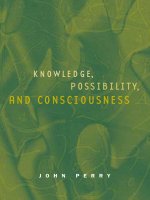the mit press subjectivity and selfhood investigating the first-person perspective jan 2006
Bạn đang xem bản rút gọn của tài liệu. Xem và tải ngay bản đầy đủ của tài liệu tại đây (893.9 KB, 275 trang )
O
O
Subjectiviy and Selhood
Dan Zahavi
Investigating the First-Person Perspective
O
O
O
O
Subjectivi
y and Sel
hood
Zahavi
What is a self? Does it exist in reality or is it a mere social
construct — or is it perhaps a neurologically induced illusion?
The legitimacy of the concept of the self has been questioned
by both neuroscientists and philosophers in recent years.
Countering this, in
Subjectivity and Selfhood, Dan Zahavi argues
that the notion of self is crucial for a proper understanding
of consciousness. He investigates the interrelationships of
experience, self-awareness, and selfhood, proposing that
none of these three notions can be understood in isolation.
Any investigation of the self, Zahavi argues, must take the
first-person perspective seriously and focus on the experiential
givenness of the self. Subjectivity and Selfhood explores a number of
phenomenological analyses pertaining to the nature of con-
sciousness, self, and self-experience in light of contemporary
discussions in consciousness research.
Philosophical phenomenology — as developed by Husserl,
Heidegger, Sartre, Merleau-Ponty, and others — not only
addresses crucial issues often absent from current debates
over consciousness but also provides a conceptual framework
for understanding subjectivity. Zahavi fills the need— given
the recent upsurge in theoretical and empirical interest in
subjectivity—for an account of the subjective or phenomenal
dimension of consciousness that is accessible to researchers
and students from a variety of disciplines. His aim is to use
phenomenological analyses to clarify issues of centr
al impor-
tance to philosophy of mind, cognitive science, developmental
psychology, and psychiatry. By engaging in a dialogue with
other philosophical and empirical positions, says Zahavi,
phenomenology can demonstr
ate its vitality and contempor
ary
relevance.
Dan Zahavi is Professor of Philosophy and Director of the
Center for Subjectivity Research at the University of Copen-
hagen and the author of Self-Awareness and Alterity in Husserl’s
Phenomenology
.
A Bradford Book
Photo b
y Scanpix/
Morten Juhl
“Zahavi delivers a critical phenomenological account of the subjectivity of experience that shows how
phenomenology is not just a description but an analysis that can contribute to explanations of
consciousness, self, and intersubjectivity. Staying deftly on target, Zahavi challenges higher-order
representational theory and standard theory-of-mind approaches to social cognition. He pushes the
phenomenological envelope and engages in an original way with traditional analytic philosophy of mind
and more recent lines of thought that are drawn from the cognitive sciences. To the list of classic phe-
nomenologists from whom Zahavi draws we need to add one more: Zahavi himself.”
Shaun Gallagher, Professor and Chair, Department of Philosophy, University of Central Florida
“Zahavi’s book is a valuable contribution to the current interdisciplinary discussion of consciousness.
In simple and direct language, he gives us a full phenomenological investigation of subjectivity and
selfhood.”
David Carr, Charles Howard Candler Professor of Philosophy, Emory University
“In this very timely book, Dan Zahavi offers a wealth of illuminating discussions centered on an integrated
investigation of self, self-awareness, and experience that take the first-personal or subjective dimensions
of consciousness seriously. Expertly rooted in philosophical phenomenology of both the Austro-German
and French traditions, but also engaging in a critical dialogue with contemporary philosophy of mind and
developmental psychology and psychiatry, he masterfully develops his case by raising precise questions and
painstakingly evaluating argumentative lines to possible answers.”
Eduard Marbach, Professor of Phenomenology and of Philosophy of Mind, University of Bern, Switzerland
“This work takes a huge step forward in bringing phenomenological philosophy to bear on contemporary
issues in the philosophy of mind and cognitive science. It is a work of major importance that no one
thinking about the philosophy and science of consciousness can afford to neglect.”
Evan Thompson, Professor, Department of Philosophy, University of Toronto
“This book is a masterful demonstration that in order to understand the nature of selfhood, it is necessary
to distinguish various levels of self-awareness as well as to consider how these levels become articulated,
starting with the direct, embodied experience of being alive in the world. With great scholarship and
clarity, Zahavi brings back the central importance of the first-person perspective.”
Philippe Rochat, Professor of Psychology, Emory University
philosophy of mind
The MIT Press
• Massachusetts Institute of Technology • Cambridge, Massachusetts 02142 •
0-262-24050-5
,!7IA2G2-ceafaf!:t;K;k;K;k
Subjectiviy and Selhood
Investigating the First-Person Perspective
Dan Zahavi
4745zahavi 12/29/05 9:13 AM Page 1
Subjectivity and Selfhood
Investigating the First-Person Perspective
Dan Zahavi
A Bradford Book
The MIT Press
Cambridge, Massachusetts
London, England
© 2005 Massachusetts Institute of Technology
All rights reserved. No part of this book may be reproduced in any form by any elec-
tronic or mechanical means (including photocopying, recording, or information
storage and retrieval) without permission in writing from the publisher.
MIT Press books may be purchased at special quantity discounts for business or sales
promotional use. For information, please email or
write to Special Sales Department, The MIT Press, 55 Hayward Street, Cambridge,
MA 02142.
This book was set in Sabon by SNP Best-set Typesetter Ltd., Hong Kong.
Printed and bound in the United States of America.
Library of Congress Cataloging-in-Publication Data
Zahavi, Dan.
Subjectivity and selfhood: investigating the first-person perspective / Dan Zahavi.
p. cm.
“A Bradford book.”
Includes bibliographical references (p. ) and index.
ISBN 0-262-24050-5 (hc : alk. paper)
1. Self (Philosophy). 2. Consciousness. 3. Subjectivity. 4. Self-knowledge, Theory of.
I. Title.
BD438.5.Z34 2006 126—dc22 2005047918
10987654321
Contents
Acknowledgments vii
Introduction 1
1
|
Self-Awareness and Phenomenal Consciousness 11
I Varieties of Self-Awareness 13
II Higher-Order Theories of Consciousness 17
III A One-Level Account of Consciousness 20
IV The Problem of Infinite Regress 25
2
|
The Concept(s) of Consciousness in Early Phenomenology 31
I Three Concepts of Consciousness 31
II The Stream of Consciousness 32
III Inner Consciousness and Self-Awareness 37
IV Some Shortcomings 44
3
|
The Structure of Time-Consciousness 49
I Subjectivity of Experience 50
II Temporality 55
III The Internal Object Account 59
IV Urbewußtsein and Self-Affection 65
4
|
Reflection and Attention 73
I Natorp’s Challenge 73
II The Criticism of Reflective Phenomenology 76
III A Hermeneutical Alternative 78
IV Pure and Impure Reflection 86
V Reflection and Alteration 89
VI Reflective versus Hermeneutical Phenomenology 96
5
|
Consciousness and Self 99
I The Non-egological Challenge 99
II Different Notions of Self 103
III The Narrative Concept of Self 106
IV The Self as an Experiential Dimension 115
V Empirical Implications 132
VI A Sense of Self 146
6
|
Self and Other 147
I Expression and Empathy 148
II Embodied Subjectivity and Internal Otherness 156
III Beyond Empathy 163
IV The Transcendence of the Other 168
V A Multidimensional Approach 174
7
|
Theory of Mind, Autism, and Embodiment 179
I Theory of Mind 179
II Theory-Theory of Self-Awareness 183
III Autism 189
IV A Critical Rejoinder 197
V Autism Revisited 215
Notes 223
References 241
Index 261
vi
|
Contents
Acknowledgments
This book is the result of prolonged interest in and work on the nature of
consciousness, self-consciousness, selfhood, and intersubjectivity. Much of
its foundational research has taken place in an interdisciplinary setting at
the Center for Subjectivity Research, a Center of Excellence located at the
University of Copenhagen and funded by the Danish National Research
Foundation.
I have learned much from my discussions with the following people, many
of whom have also read and commented on parts of the manuscript: Rudolf
Bernet, John Brough, Jonathan Cole, Steven Crowell, Ingolf Dalferth, John
Drummond, Shaun Gallagher, Arne Grøn, Thor Grünbaum, Jim Hart, Lisa
Käll, Uriah Kriegel, Dieter Lohmar, Alva Noë, Søren Overgaard, Josef
Parnas, Michael Quante, Philippe Rochat, David Rosenthal, Charles Siewert,
Galen Strawson, and Evan Thompson.
I have had the opportunity to present material from the following text
during lectures at various universities, including Rutgers, Stony Brook,
Oxford, Warwick, CREA (Paris), Stockholm, Marburg, Boston College,
Leuven, McGill, Köln, University College Dublin, Chicago, Boston Univer-
sity, New School University, Geneva, Helsinki, Würzburg, Kyoto, Tokyo,
Kent, Jyväskylä, and Heidelberg. I have profited, in every instance, from the
ensuing discussions and comments I have received.
I am very grateful to the Danish National Research Foundation, whose
generous funding permitted me to write this book. I offer a special thanks
to Institutionen San Cataldo for granting me a wonderful month at their
monastery in Italy that allowed me to develop its composition.
Finally, I would like to thank Kristina Mommens, whose diligent proof-
reading of the manuscript provided countless grammatical and linguistic
improvements.
What is a self? Does it exist in reality or is it a mere social construct—or
perhaps a neurologically induced illusion? If something like a self exists,
what role does it play in our conscious life, and how and when does it emerge
in the development of the infant? What might such psychopathological and
neuropsychiatric disorders as schizophrenia or autism reveal about the
fragility of self-identity and self-coherence? As this brief list of questions indi-
cates, the contemporary discussion of the self is highly interdisciplinary in
nature (see, e.g., Gallagher and Shear 1999; Zahavi 2000; Kircher and David
2003).
The legitimacy of the concept of self has recently been questioned by both
neuroscientists and philosophers. Some have argued that the self is nothing
but an illusion created by an interplay of various subsystems and modules
in the brain (Dennett 1991; Wegner 2002; Metzinger 2003a). Others have
claimed that the concept of self is a Eurocentric invention with limited his-
torical relevance (Berrios and Marková 2003). In contrast, the hypothesis to
be defended in the following chapters is that the notion of self is crucial for
a proper understanding of consciousness, and consequently it is indispens-
able to a variety of disciplines such as philosophy of mind, social philoso-
phy, psychiatry, developmental psychology, and cognitive neuroscience.
It would, of course, be something of an exaggeration to claim that the
concept of self is unequivocal and that there is widespread consensus about
what, exactly, it means to be a self. Quite to the contrary, the concept is cur-
rently used in a manifold of rival senses and it is a simple fact that the concept
connotes different things in different disciplines—sometimes radically dif-
ferent things. What is urgently needed is a clarification of the relationship
between these sometimes conflicting, sometimes complementary notions and
aspects of selfhood. Moreover, such a taxonomic clarification is essential in
order to evaluate the merits of the “no-self” doctrine, that is, the claim that
the self is nothing but a fiction.
Such an investigation may also help clarify the perennial question con-
cerning the relation between self and other. To what extent does selfhood
involve interpersonal relations? Is the self necessarily embodied and embed-
ded in a physical, social, and historical environment? Some have argued that
the constitution of the self is a social process, that we are selves not by indi-
vidual right, but in virtue of our relation to others and that we achieve self-
awareness by adopting the perspective of the other toward ourselves. Who
one is depends on the values, ideals, and goals one has: it is a question of
what has significance and meaning, and this, of course, is conditioned by the
linguistic community to which one belongs. Thus, it has been said that one
cannot be a self on one’s own, but only together with others. Others have
denied that selfhood and self-experience emerge in the course of a (long)
developmental process. While recognizing that the maturation of the self is
a complex social process, they have also insisted that the sense of self is an
integral and fundamental part of conscious life, which the infant is already
in possession of from birth onward.
In order to shed light on these issues, I intend to investigate the relation
between experience, self-awareness, and selfhood. What is the relation
between (phenomenal) consciousness and the self? Are experiences always
experiences for someone? Is it a conceptual and experiential truth that any
episode of experiencing necessarily involves a subject of experience? Must
we evoke a subject of experience in order to account for the unity and con-
tinuity of experience, or are experiences rather anonymous mental events
that simply occur without being states or properties of anybody? What is
the relation between self-awareness and the self? When we speak of self-
awareness, do we then necessarily also speak of a self? Is there always a self
involved in self-awareness, or is it possible to speak of self-awareness without
assuming the existence of anybody being self-aware? Is self-awareness always
to be understood as awareness of a self, or can it rather be understood simply
as the awareness that a specific experience has of itself? Finally, what is the
relation between consciousness and self-awareness? Is self-awareness the
exception rather than the rule, insofar as consciousness is concerned? Is it
something that occurs only occasionally in the life of the mind, or is it rather
the case that conscious mental states differ from nonconscious mental states
precisely by involving self-awareness, that is, is self-awareness a defining
feature of all conscious states?
2
|
Introduction
My claim is that none of the three notions can be properly understood in
isolation. If we wish to understand what it means to be a self, we will have
to examine the structure of experience and self-awareness, and vice versa.
To put it differently, the claim I wish to make is that the investigations of
self, self-awareness, and experience must be integrated if they are to be
successful.
This approach is not without precedent. Many phenomenologists have
engaged the question of self by focusing on its experiential givenness and by
taking the first-person perspective seriously. They have typically taken an
investigation of self-awareness to be crucial for an understanding of what it
means to be a self; that is, they have typically argued that no account of self
that failed to explain the experiential accessibility of the self to itself could
be successful.
But why should one take the first-person perspective seriously, and why
should one pay any attention to what phenomenology might have to say
on the issue of selfhood and subjectivity? Is it not—as has recently been
claimed—a discredited research program that has been intellectually bank-
rupt for at least fifty years?
1
Although this might have been a prevalent view
in mainstream cognitive science and analytical philosophy of mind, the
current situation is slightly more blurred. It is true that many scientists have,
until recently, considered the study of phenomenal consciousness to be inher-
ently unreliable owing to its subjective nature and thus unsuitable for sci-
entific research. As Damasio writes, “studying consciousness was simply not
the thing to do before you made tenure, and even after you did it was looked
upon with suspicion” (Damasio 1999, 7). Some even went so far as to deny
the existence of phenomenal consciousness (e.g. Rey 1991, 692). Within the
last decade or so, however, a profound change has taken place, one occa-
sionally described in terms of an ongoing “consciousness boom.” Many new
journals devoted to the study of consciousness have been established, and
currently many scientists regard questions pertaining to the nature of phe-
nomenal consciousness, the structure of the first-person perspective, and the
status of the self to be among the few remaining major unsolved problems
of modern science.
After a (too) long period of behaviorism and functionalism, it has conse-
quently become rather obvious that the problem of subjectivity will not
simply go away. A satisfying account of consciousness cannot make do with
a mere functional analysis of intentional behavior, but must necessarily take
Introduction
|
3
the first-personal or subjective dimension of consciousness seriously. Much
consciousness research is still aimed at locating and identifying particular
neural correlates of consciousness. Yet there is also a growing realization
that we will not get very far in giving an account of the relationship between
consciousness and the brain unless we have a clear conception of what it
is that we are trying to relate. To put it another way, any assessment of
the possibility of reducing consciousness to neuronal structures and any
appraisal of whether a naturalization of consciousness is possible will require
a detailed analysis and description of the experiential aspects of conscious-
ness. As Nagel once pointed out, a necessary requirement for any coherent
reductionism is that the entity to be reduced is properly understood (Nagel
1974, 437).
Given the recent interest in the subjective or phenomenal dimension of
consciousness, it is no wonder that many analytical philosophers have started
to emphasize the importance of phenomenology. An example is Owen
Flanagan, who in his 1992 book Consciousness Reconsidered argues for
what he calls the natural method. If we wish to undertake a serious investi-
gation of consciousness we cannot make do with neuroscientific or psycho-
logical (i.e., functional) analyses alone; we also need to give phenomenology
its due (Flanagan 1992, 11). Thus, when studying consciousness rather than,
say, deep-sea ecology, we must take phenomenological considerations into
account since an important and nonnegligible feature of consciousness is the
way in which it is experienced by the subject. Similar claims can be found
in the recent work of Searle, Block, McGinn, Chalmers, Strawson, and Baars,
among many others.
At first glance, this might indeed seem to indicate that there has been a
change of attitude, that the customary hostility is a thing of the past, and
that analytical philosophers and cognitive scientists are currently apprecia-
tive of the philosophical resources found in phenomenology. Things are not
that simple, however. Although a small number of prominent figures in con-
sciousness research have recently started to take philosophical phenomeno-
logy seriously, the vast majority of (Anglophone) philosophers and cognitive
scientists are not using the term in its technical sense when they talk of phe-
nomenology, but are still simply referring to a first-person description of
what the “what it is like” of experience is really like. In fact, there has been
a widespread tendency to identify phenomenology with some kind of intro-
spectionism. Phenomenology is not, however, just another name for a kind
4
|
Introduction
of psychological self-observation; rather it is the name of a philosophical
approach specifically interested in consciousness and experience inaugurated
by Husserl and further developed and transformed by, among many others,
Scheler, Heidegger, Gurwitsch, Sartre, Merleau-Ponty, Lévinas, Henry, and
Ricoeur.
Philosophical phenomenology can offer much more to contemporary con-
sciousness research than a simple compilation of introspective evidence.
2
Not
only does it address issues and provide analyses that are crucial for an under-
standing of the true complexity of consciousness and which are nevertheless
frequently absent from the current debate, but it can also offer a conceptual
framework for understanding subjectivity that might be of considerably
more value than some of the models currently in vogue in cognitive science.
By ignoring the tradition and the resources therein, contemporary con-
sciousness research risks missing out on important insights that, in the best
of circumstances, will end up being rediscovered decades or centuries later
(see, e.g., Zahavi 2002a, 2004a).
To put it bluntly, given some of the recent developments in cognitive
science and analytical philosophy of mind along with the upsurge of theo-
retical and empirical interest in the subjective or phenomenal dimension of
consciousness, it is simply counterproductive to continue to ignore the analy-
ses of consciousness that phenomenology can provide. The fact that subjec-
tivity has always been of central concern for phenomenologists, and that
they have devoted so much time to a scrutiny of the first-person perspective,
the structures of experience, time-consciousness, body-awareness, self-
awareness, intentionality, and so forth, makes them obvious interlocutors.
The present book is an attempt to redeem some of these promissory notes.
It will explore and present a number of phenomenological analyses pertain-
ing to the nature of consciousness, self, and self-experience, but with an eye
to contemporary discussions in consciousness research. This approach is
motivated not only by the belief that consciousness research can profit from
insights to be found in phenomenology; but also by the firm conviction that
phenomenology needs to engage in a more critical dialogue with other philo-
sophical and empirical positions than is currently the case. It is precisely by
confronting, discussing, and criticizing alternative approaches that pheno-
menology can demonstrate its vitality and contemporary relevance. Of
course this is not to deny that phenomenology has its own quite legitimate
agenda; but the very attempt to engage in such a dialogue with analytical
Introduction
|
5
philosophy of mind, developmental psychology, or psychopathology might
force phenomenology to become more problem oriented and thereby coun-
teract what is currently one of its greatest weaknesses: its preoccupation with
exegesis.
3
Chapter 1
The first chapter will provide a preliminary outline of a phenomenological
account of the relation between consciousness and self-awareness. The main
focus will be on Sartre’s concept of pre-reflective self-awareness and on his
claim that the experiential dimension is as such characterized by a primitive
or minimal type of self-awareness. Sartre’s view will first be contrasted with
a number of competing definitions of self-awareness found in developmen-
tal psychology, social philosophy, and philosophy of language. It will then
be compared in detail to a prevalent version of the higher-order theory of
consciousness, according to which the difference between a conscious and a
nonconscious mental state rests on the presence or absence of a relevant
meta-mental state. Despite a superficial similarity, it will be shown that
Sartre’s theory differs from the higher-order theory by its firm commitment
to a one-level account of consciousness. The chapter will conclude by dis-
cussing whether higher-order theories can adequately account for the first-
person perspective, or whether their attempt to do so gives rise to an infinite
regress.
After setting the scene in the introductory chapter, the phenomenological
analyses of the relation between self, consciousness, and self-consciousness
will be discussed in more detail in the next three chapters. The focus, in par-
ticular, will be on Husserl’s initial analysis of consciousness in Logische
Untersuchungen (chapter 2), on his later analysis of time-consciousness
(chapter 3), and on Heidegger’s discussion of whether reflection can provide
us with reliable access to the experiential dimension (chapter 4).
Chapter 2
The second chapter will take up two issues that are discussed in the begin-
ning of Husserl’s Fifth Logical Investigation (1901), and which will be crucial
to the argument in the chapters to follow. The first issue concerns whether
consciousness contains an ego, or in other words, whether every episode of
6
|
Introduction
experiencing necessarily involves a subject of experience. The second asks
how we aware of our own occurrent experiences; how are they given to us?
Husserl’s answer to the first question constitutes a defense of a non-
egological theory of consciousness that in many ways anticipates Sartre’s
arguments in La transcendance de l’ego. His reply to the second question
takes the form of a critical response to Brentano’s position in Psychologie
vom empirischen Standpunkt. I will analyze Sartre’s and Brentano’s positions
and show that Husserl, contrary to what has been the prevalent inter-
pretation, advocated a concept of pre-reflective self-awareness already in
Logische Untersuchungen.
Chapter 3
Husserl’s discussion of self, consciousness, and self-awareness in Logische
Untersuchungen was not the culmination, however, but only the beginning
of his lifelong struggle with these issues. The third chapter will investigate
the considerably more complex and sophisticated account that can be found
in Husserl’s later writings on inner time-consciousness (1905–1910,
1917–1918). It is in these lectures and research manuscripts that Husserl
attempted to analyze the inner structure of pre-reflective self-awareness in
terms of the temporal schema protention–primal presentation–retention.
One of the questions to be discussed is whether our experiences are given as
objects in inner time-consciousness prior to reflection, or whether pre-
reflective self-awareness is by nature nonobjectifying.
Chapter 4
Phenomenology is generally assumed to employ a reflective methodology.
But does reflection provide us with a reliable and trustworthy access to sub-
jectivity, or does it rather objectify and distort that which it makes appear?
Natorp discussed this question in his Allgemeine Psychologie (1912), and
the conclusion he reached was highly anti-phenomenological. In the fourth
chapter, I give a presentation of Natorp’s neo-Kantian criticism followed by
a discussion of Heidegger’s subsequent response to it. This response can be
found in Heidegger’s early Freiburg lectures (1919–1922), and apart from
addressing the concerns of Natorp, it provides a clear exposé of Heidegger’s
early views on self and experience. One of the implications of the analysis
Introduction
|
7
is that “reflection” is a polysemical term and that it is necessary to
distinguish between different types of reflection. This is a view shared by
Sartre, Husserl, and Merleau-Ponty. Although all of the latter rejected the
view that reflection necessarily distorts lived experience (they occasionally
compare reflection to attention), they nevertheless insisted that reflection
does occasion a kind of self-alteration. Indeed, some forms of reflection
might even be characterized as a kind of self-alienation. They involve the
adoption of the perspective of the other on oneself. The chapter concludes
by discussing the tenability of the customary distinction between two types
of phenomenology, a reflective and a hermeneutical.
Chapter 5
After the detailed analyses in chapters 2–4, the central fifth chapter of the
book will contain an extensive discussion of subjectivity and selfhood. The
chapter will begin by discussing some classical and contemporary arguments
in favor of a non-egological theory of consciousness and will then turn to a
detailed analysis of two different notions of self: (1) the self as a narrative
construction and (2) the self as an experiential dimension. The narrative
approach, advocated by Ricoeur, MacIntyre, and Dennett, among others,
conceives of the self as the product of a narratively structured life, thereby
stressing the socially and linguistically constructed character of the self; the
experiential approach, primarily defended by Husserl and Henry, insists that
an investigation of the self must necessarily involve the first-person perspec-
tive and ultimately conceives of the self as the invariant dimension of
first-personal givenness within the multitude of changing experiences. After
considering some of the limitations of the narrative approach, in particular
the concern that by declaring the self a construction, it might be committed
to a version of the no-self doctrine and, after analyzing the structure of first-
personal givenness and phenomenal consciousness in detail, thereby adding
new facets to the previous discussion in chapter 1, I will argue that the two
notions of self are complementary. At the same time, I argue that the expe-
riential notion of a core or minimal self is both more fundamental than and
a presupposition of the narrative self. The chapter concludes by discussing
some of the empirical implications of this conclusion, in particular its rele-
vance for our understanding of the disorders of self encountered in neuro-
logical and psychiatric afflictions.
8
|
Introduction
The references in chapter 4 and 5 to intersubjectively mediated forms of
self-awareness and self-understanding lead to a focused discussion of the
relation between the experience of self and the experience of others in the
final two chapters of the book.
Chapter 6
The sixth chapter will provide a systematic outline of the different phe-
nomenological approaches to intersubjectivity (Scheler, Heidegger, Merleau-
Ponty, Husserl, and Sartre), thereby allowing for a more nuanced perspective
on the link between selfhood and otherness. The point of departure will be
Scheler’s criticism of the argument from analogy. It will quickly become clear
that a proper understanding of our experience of others must entail a proper
understanding of the relation between experience and expressive behavior.
Our understanding of how we come to experience others as minded bodies
must include a correct appreciation of how we come to experience ourselves
as embodied minds. This observation, however, which will be crucial to the
discussion of the theory of mind in chapter 7, is, only the beginning. Much
more is at stake in the phenomenological analyses than simply a “solution”
to the “traditional” problem of other minds. Intersubjectivity does not
merely concern concrete face-to-face encounters between individuals. It is
also something that is at play in perception, in the use of tools, in the expres-
sion of various emotions, and in different types of self-experience and self-
apprehension. Ultimately, the phenomenologists will argue that a treatment
of intersubjectivity requires a simultaneous analysis of the relationship
between subjectivity and world. It is not satisfactory to simply insert
intersubjectivity somewhere within an already established metaphysical
framework; rather, the three dimensions “self,” “others,” and “world”
reciprocally illuminate one another and can be fully understood only in their
interconnection.
Chapter 7
The concluding seventh chapter will address the problem of selfhood and
self-awareness by discussing the validity of the theory-theory of mind, that
is, the validity of the claim that the experience of minded beings (be it oneself
or others) requires a theory of mind. This claim has found wide resonance
Introduction
|
9
in a number of empirical disciplines, not the least in the study of autism. Is
it true, however, that self-awareness and intersubjectivity—the experience of
self and of others—are theoretical, inferential, and quasi-scientific in nature?
Is it true that mental states are unobservable and are theoretically postulated
explanatory devices introduced in order to help us predict and explain behav-
ioral data? Drawing on insights and results obtained in the previous chap-
ters (in particular the discussions of higher-order theories, of pre-reflective
self-awareness, of self-disorders in schizophrenia, and of embodied inter-
subjectivity) and supplementing these with empirical findings from contem-
porary developmental psychology concerning infantile experience of self and
other, I will argue here that the theory-theory of mind is mistaken when it
claims that theoretical knowledge constitutes the core of what we call upon
when we understand ourselves and others.
10
|
Introduction
1 Self-Awareness and Phenomenal Consciousness
One should not overestimate the homogeneity of the phenomenological tra-
dition; like any other tradition, it spans many differences. Although phe-
nomenologists might disagree on important questions concerning method
and focus, and even about the status and existence of self, they are in nearly
unanimous agreement when it comes to the relation between consciousness
and self-consciousness. Literally all the major figures in phenomenology
defend the view that the experiential dimension is characterized by a tacit
self-consciousness.
In Erste Philosophie II, for instance, Husserl wrote that the experiential
stream is characterized by a “Für-sich-selbst-erscheinens,” that is, by a self-
appearance or self-manifestation (Hua 8/189, 412).
1
Throughout his writ-
ings, he argued that self-consciousness, rather than being something that
occurs only during exceptional circumstances, namely whenever we pay
attention to our conscious life, is a feature characterizing subjectivity as such,
no matter what worldly entities it might otherwise be conscious of and occu-
pied with. As he put it in Zur Phänomenologie der Intersubjektivität II, “To
be a subject is to be in the mode of being aware of oneself” (Hua 14/151).
We find similar ideas in Heidegger. Heidegger argued that the self is present
and implicated in all of its intentional comportments. Thus, the intentional
directedness toward worldly entities is not to be understood as an intentional
experience that gains a reference to the self only afterward, as if it would
first have to turn its attention back upon itself with the help of a subsequent
(reflective) experience. Rather, the co-disclosure of the self belongs to in-
tentionality as such (Heidegger GA 24: 225; GA 27: 208).
2
Heidegger also
wrote that every worldly experiencing involves a certain component of self-
acquaintance and self-familiarity, and that every experiencing is character-
ized by the fact that “I am always somehow acquainted with myself”
(Heidegger GA 58: 251). Adopting a more traditional terminology in his
lecture course Einleitung in die Philosophie from 1928–29 he stated, “Every
consciousness is also self-consciousness” (Heidegger GA 27: 135).
Sartre, probably the best-known defender of a phenomenological theory
of self-consciousness, considered consciousness to be essentially character-
ized by intentionality. He also claimed, however, that each intentional
experience is characterized by self-consciousness. Thus, Sartre took self-
consciousness to constitute a necessary condition for being conscious of
something. To perceive a withering oak, a dance performance, or a red pillow
consciously without being aware of it, that is, without having access to or
being acquainted with the experience in question was, for Sartre, a manifest
absurdity (Sartre 1943, 18, 20, 28; 1948, 62). This line of thought is elab-
orated in the important introduction to L’être et le néant, where he claimed
that an ontological analysis of intentionality leads to self-consciousness since
the mode of being of intentional consciousness is to be for-itself (pour-soi),
that is, self-conscious. An experience does not simply exist; it exists for itself,
that is, it is given for itself, and this self-givenness is not simply a quality
added to the experience, a mere varnish, but it rather constitutes the very
mode of being of the experience. As Sartre wrote: “This self-consciousness
we ought to consider not as a new consciousness, but as the only mode of
existence which is possible for a consciousness of something” (Sartre 1943,
20 [1956, liv]).
These claims should not be misunderstood. The phenomenologists are not
advocating strong theses concerning total and infallible self-knowledge;
rather they are calling attention to the constitutive link between experiential
phenomena and first-personal givenness or accessibility. They are empha-
sizing the importance of considering the first-person perspective when
elucidating phenomenal consciousness. When speaking of a first-person
perspective it is important to be clear about the distinction between having
such a perspective and being able to articulate it linguistically (eventually to
be labeled as a weak and strong first-person perspective, respectively).
Whereas the latter obviously presupposes mastery of the first-person
pronoun, the former is simply a question of having first-personal access to
one’s own experiential life. Although both capabilities deserve to be investi-
gated, phenomenologists have mainly been accentuating the significance
of the former.
3
They would consequently concur with the observation by
Shoemaker that “it is essential for a philosophical understanding of the
12
|
Chapter 1
mental that we appreciate that there is a first person perspective on it, a dis-
tinctive way mental states present themselves to the subjects whose states
they are, and that an essential part of the philosophical task is to give an
account of mind which makes intelligible the perspective mental subjects
have on their own mental lives” (Shoemaker 1996, 157). Whereas others
must rely on what I say and do in order to know what I think or feel, first-
person ascriptions of psychological states are immediate in the sense of not
being based on observational or inferential evidence. Rather, they are based
on a “direct acquaintance” with the mental states themselves.
The claim concerning immediacy is a claim concerning the character
of first-person access, and has little to do with epistemic claims concerning
infallibility or incorrigibility. Thus, in cases of careless self-description, for
instance, first-person beliefs can certainly be corrected by others or be over-
ridden by external evidence. Furthermore, not all self-knowledge is of the
immediate kind. Much is, as Moran puts it, hard-won knowledge based on
the same kinds of considerations that are available to others (Moran 2001,
xxx). However, all of this does not change the fact that a satisfying theory
of consciousness has to account for the first-personal access to our own con-
sciousness that each of us enjoy.
4
I Varieties of Self-Awareness
What has first-person accessibility to do with self-awareness? The term “self-
awareness” is notoriously ambiguous; the philosophical, psychological,
and neuroscientific literatures are filled with competing, conflicting, and
complementary definitions. Let us take a quick look at some of the main
candidates.
In philosophy, many have sought to link self-awareness to the ability to
think “I”-thoughts. A recent defense of such an approach can be found in
Baker, who has argued that all sentient beings are subjects of experience,
that they all have perspectival attitudes and that they all experience the world
from their own egocentric perspective. In doing so they show that they are
in possession of what Baker calls weak first-person phenomena (Baker 2000,
60, 67). Merely having a subjective point of view, however, is not enough
for having self-awareness. In order to be in possession of self-awareness,
which Baker considers a strong first-person phenomenon, one must be able
to think of oneself as oneself. It is not enough to have desires and beliefs, it
Self-Awareness and Phenomenal Consciousness
|
13
is not enough to have a perspectival attitude, nor is it enough to be able to
distinguish between self and nonself; one must also be able to conceptualize
this distinction. Baker consequently argues that self-awareness presupposes
the possession of a first-person concept. One is self-conscious only from the
moment one can conceive of oneself as oneself and has the linguistic ability
to use the first-person pronoun to refer to oneself (Baker 2000, 67–68; see
also Block 1997, 389). Given this definition, self-awareness is obviously
taken to be something that emerges in the course of a developmental process
and depends on the eventual acquisition of concepts and language.
Another popular and related philosophical move has been to argue that
self-consciousness, in the proper sense of the term, requires consciousness of
a self. In other words, for a creature to be self-conscious it is not sufficient
that the creature in question be able to self-ascribe experiences on an indi-
vidual basis without recognizing the identity of that to which the experiences
are ascribed. Rather the creature must be capable of thinking of the self-
ascribed experiences as belonging to one and the same self. Thus, genuine
self-consciousness requires that the creature is capable of being conscious of
its own identity as the subject, bearer, or owner of different experiences (cf.
Cassam 1997, 117–119).
If we shift terrain and move into social psychology, we will frequently
encounter the claim, famously defended by Mead, that self-consciousness is
a matter of becoming an object to oneself in virtue of one’s social relations
to others, that is, that self-consciousness is constituted by adopting the
perspective of the other toward oneself (Mead 1962, 164, 172). According
to this account, self-awareness is per se a social phenomenon. It is not
something you can acquire on your own. As Mead wrote: “Consciousness,
as frequently used, simply has reference to the field of experience, but self-
consciousness refers to the ability to call out in ourselves a set of definite
responses which belong to the others of the group. Consciousness and self-
consciousness are not on the same level. A man alone has, fortunately or
unfortunately, access to his own toothache, but that is not what we mean
by self-consciousness” (Mead 1962, 163; see also 171–172).
Within developmental psychology, the so-called mirror-recognition task
has occasionally been heralded as the decisive test for self-consciousness.
Hence, it has been argued that self-awareness is present only from the
moment when the child (at around eighteen months) is capable of recogniz-
ing itself in the mirror (see Lewis 2003, 281–282).
14
|
Chapter 1
Some, however, have raised the stakes even further and have argued that
self-consciousness presupposes possession of a theory of mind. Roughly, the
idea is that self-consciousness requires the ability to be aware of experiences
as experiences, which in turn requires possession of a concept of experience.
However, this concept cannot stand alone. It gets its significance from being
embedded in a network of theoretical concepts. In particular, to think of
experiences as experiences requires one to have the conception of objects
or states of affairs that are capable of being experienced and of existing
unexperienced. This has made some argue that children do not gain self-
awareness until around the age of four, and that one can test the presence
of self-awareness by using classical theory of mind tasks, such as the false-
belief task or the appearance–reality task (see chapter 7 below).
There are kernels of truth in all of these definitions in the sense that they all
capture various important aspects of the phenomenon; yet none of them have
much to do with the minimalist take on self-awareness found in phenome-
nology. Using present-day terminology, the phenomenological line of thought
can be construed as follows: Self-consciousness is not merely something that
comes about the moment one scrutinizes one’s experiences attentively (let
alone something that only comes about the moment one recognizes one’s
own mirror image, refers to oneself using the first-person pronoun, or is in
possession of identifying knowledge of one’s own life story). Rather, self-
consciousness comes in many forms and degrees. It makes perfect sense to
speak of self-consciousness whenever I am not simply conscious of an exter-
nal object—a chair, a chestnut tree, or a rising sun—but acquainted with my
experience of the object as well, for in such a case my consciousness reveals
itself to me. Thus, the basic distinction to be made is the distinction between
the case where an object is given (object-consciousness) and the case wherein
consciousness itself is given (self-consciousness). In its most primitive and
fundamental form, self-consciousness is taken to be a question of having
first-personal access to one’s own consciousness; it is a question of the first-
personal givenness or manifestation of experiential life.
Most people are prepared to concede that there is necessarily something
“it is like” for a subject to undergo an experience (to taste ice cream, to feel
joy, to remember a walk in the Alps). However, insofar as there is something
it is like for the subject to have the experience, the subject must in some way
have access to and be acquainted with the experience. Moreover, although
Self-Awareness and Phenomenal Consciousness
|
15
conscious experiences differ from one another—what it is like to smell
crushed mint leaves is different from what it is like to see a sunset or to hear
Lalo’s Symphonie Espagnole—they also share certain features. One com-
monality is the quality of mineness, the fact that the experiences are char-
acterized by first-personal givenness. That is, the experience is given (at least
tacitly) as my experience, as an experience I am undergoing or living
through. Given this outlook, it is natural to argue that self-awareness is of
pertinence for an understanding of phenomenal consciousness. In fact, phe-
nomenal consciousness must be interpreted precisely as entailing a minimal
or thin form of self-awareness. On this account, any experience that lacks
self-awareness is nonconscious (cf. Zahavi 1999, 2002a, 2003a).
5
In analytical philosophy of mind, an analogous view has been defended
by Flanagan, who not only argues that consciousness involves self-
consciousness in the weak sense that there is something it is like for the
subject to have the experience, but who has also spoken of the low-level self-
consciousness involved in experiencing my experiences as mine (Flanagan
1992, 194). Arguing along similar lines, Kriegel has more recently claimed
that peripheral self-consciousness is an integral moment of phenomenal con-
sciousness. As he writes, “It is impossible to think or experience something
consciously without thinking or experiencing it self-consciously, i.e., without
being peripherally aware of thinking or experiencing it” (Kriegel 2004, 200).
Thus, in his view, unless a mental state is self-conscious, there will be nothing
it is like to undergo the state, and it therefore cannot be a phenomenally
conscious state (Kriegel 2003, 103–106).
6
Let me forestall a possible objection, namely that such a minimal defini-
tion of self-awareness is entirely too broad and includes too much. That is,
since it does not match our everyday or folk-psychological notion of self-
awareness, which tends to view it as the ability to recognize or identify
ourselves in a thematic way, the present use of the term is inappropriate.
However, I do not think this objection carries much weight. First, from a
conceptual point of view, there are no intrinsic problems whatsoever in using
the term “self-awareness” to designate a situation where consciousness
is aware of or given to itself. Second, many of the classical philosophical
theories of self-awareness, as well as the more recent contributions by such
thinkers as Brentano, Husserl, Sartre, Henry, Henrich, and Frank, among
others, have been discussions of precisely this broad notion (see Zahavi
1999).
16
|
Chapter 1









